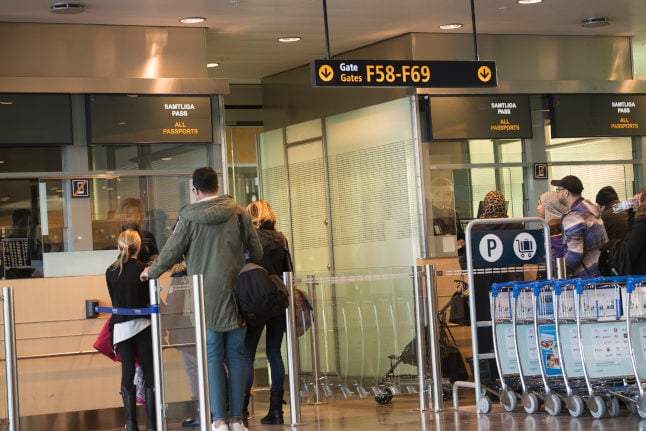British citizens and other people travelling from the UK who live and work in Sweden will after all be exempted from a ban on travel into Sweden from the UK, the Swedish government confirmed on Wednesday afternoon.
The changes will come into effect at midnight and will, as before, apply until January 21st.
“When it comes to the UK it is important that we aim to act together with the rest of the EU in what is a particular situation. The changes to the entry ban are in line with the common EU approach. It is also reasonable that people who live and work in Sweden should be able to return,” read a government statement.
People who need to travel for urgent family reasons will also be exempted from the entry ban.
The news comes less than a day after a justice ministry spokesperson told The Local that Sweden would not make any changes to the entry ban, which only made exceptions for Swedish citizens when it was introduced on Monday.
The British embassy said it had been in contact with Swedish decision-makers to try to find a solution for Brits stranded in the UK. “The Ambassador has raised concerns with Swedish officials about UK nationals resident in Sweden being able to return home. We continue to engage to try and minimise disruption for travellers and ensure commercial routes to the UK remain open,” an embassy spokesperson told The Local earlier today.
It won't all be plain sailing for anyone hoping to return home from the UK to Sweden. A separate ban on flights from UK-Sweden, which was set to expire at 4pm today, has been extended until the end of the year.
Ambulance flights and flights transporting goods may continue to operate as normal.
The Swedish Transport Agency will be able to lift the flight ban before December 31st, if the Public Health Agency believes it is justified in terms of Covid-19 infection control.
British Ambassador Judith Gough told The Local that Brits who live in Sweden could still return if they could find flight connections: “Our understanding is that people should be able to come in via third countries, but obviously travellers will want to be well-informed as to how that works given travel restrictions elsewhere.”
“Those who live and work in Sweden but don't yet have uppehållstillstånd must be able to demonstrate that they live and work in Sweden.”
A message for British Citizens who are resident in Sweden from Ambassador @JudithMGough pic.twitter.com/0ZbzLe6akF
— Brittiska Ambassaden Stockholm (@UKinSweden) December 23, 2020
The decision to tighten travel restrictions against the UK was taken due to the spread of a mutated form of Covid-19, which first appeared in London and Kent. It is reported to be up to 70 percent more contagious than other strains, but based on what scientists know so far, does not appear to cause more serious illness.
There are recommendations in place for anyone who travelled from the UK to Sweden from December 12th. You should stay at home and avoid all close contacts for as long as you can and for at least a week after arriving, the Public Health Agency said. This is to limit the risk of spreading the new variant of the virus within Sweden.
You should also take a PCR test for the coronavirus as soon as possible after arriving, and repeat the test on the fifth day after arriving. If you receive a positive result you should follow the usual guidelines for this situation: staying at home and avoiding all close contacts once you are both completely symptom-free and at least seven days have passed since the positive test result. If you need medical advice, call 1177.
If you work in the medical or care sector, extra restrictions apply. It is especially crucial that you stay at home and avoid contacts if you have recently returned from the UK or even if someone you live with has recently returned from the UK. If you returned from the UK from December 12th onwards and work in these sectors, you should let your employer know so that they can arrange regular testing.
The sudden travel bans, in Sweden and several other European countries, have created hurdles for any Brits who were hoping to move to the EU before the post-Brexit transition period ends on December 31st. After the turn of the year, they will be covered by the same migration rules as other third-country nationals.
“British Citizens hoping to move to Sweden before the end of the transition period should refer to advice from the Swedish Migration Agency (Migrationsverket),” a British embassy spokesperson told The Local by email.
“Migrationsverket have told the British Embassy that applicants with evidence of a life in Sweden prior to 31 December, do not need to be in Sweden before 31 December in order to apply for the new residents status. However, if you are unable to demonstrate a life in Sweden prior to 31 December, you do not fall within scope of the Withdrawal Agreement. Those with questions about this should refer to the Migration Agency.”




 Please whitelist us to continue reading.
Please whitelist us to continue reading.
Member comments